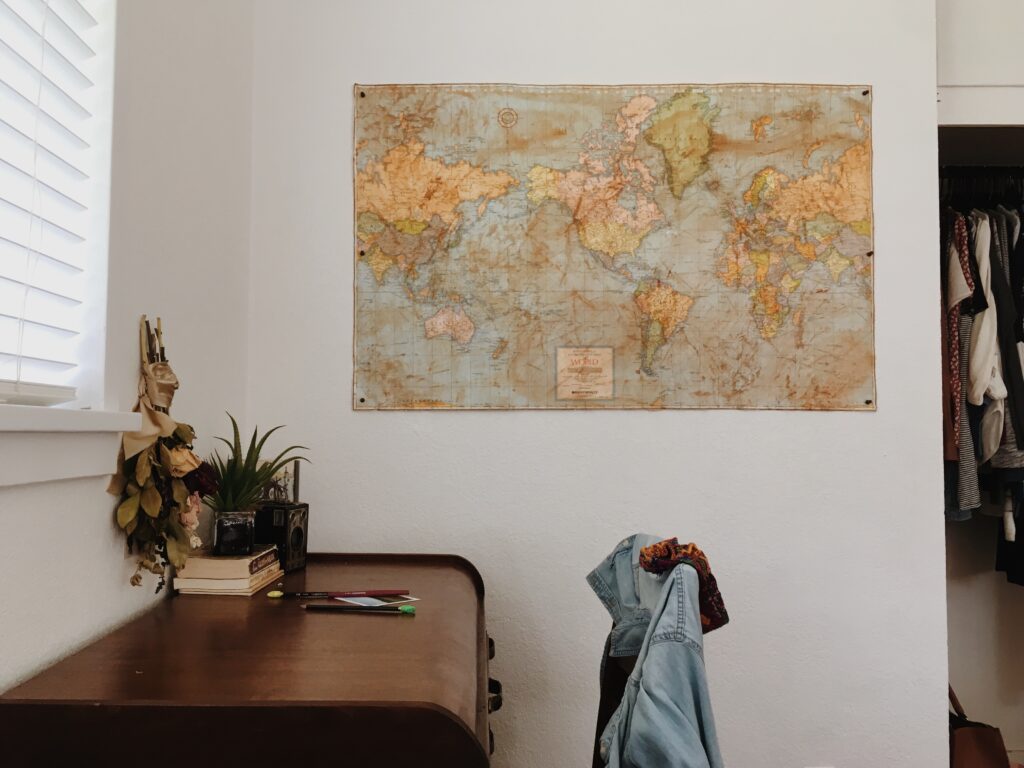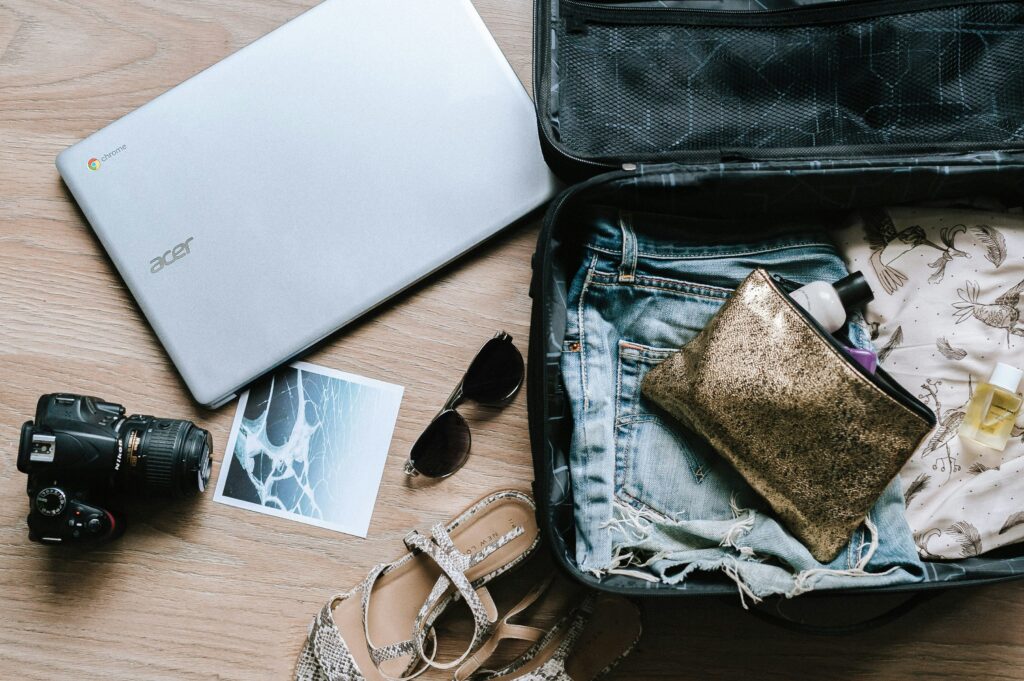Traveling while working remotely provides an exciting opportunity to explore new destinations without using any PTO.
One of the key benefits of working from a laptop is the ability to change scenery, recharge, and avoid burnout, ultimately benefiting both the employee and the company. It allows for better work-life balance and can also lead to increased job satisfaction.
As a full-time remote employee, I’ve taken my fair share of ‘hush trips’ – trips where I’ve worked from a vacation spot without notifying my employer.
While I’m extremely grateful for the flexibility my remote job provides, traveling while working remotely is not for everyone.
There are challenges associated with it that can include finding reliable internet access, navigating different time zones, and a LOT of self-discipline. Before packing your bags, it’s important to be proactive in planning and setting realistic expectations for yourself while on the road.
In this post, I’ll share how to CORRECTLY plan so you can enjoy the best of both worlds – exploring new destinations while maintaining a steady income and professional growth.
If you’re ready to take your work-from-home job to a work-from-the-road job, keep reading!
Things To Consider First
If you work from home, can you work from…anywhere? Possibly.
But before you take off and escape your home office, here are a few things to consider and ask yourself to determine if traveling while working remotely is right for you.
Review Your Company’s IT Policy
The first step you should take is reviewing your company’s IT policy and employee handbook. You’ll want to make sure you don’t go against any policies.
As a full-time employee, if you received a company-issued laptop, your employer may have language around accessing company data and assets while traveling.
This will vary across different companies but could include cybersecurity protocols such as having a VPN, multi-factor authentication, or encryption set up. If you’re planning to travel internationally, you want to ensure these will work.
The last thing you want happening is your access being denied during your travels! That will end up being a very awkward conversation with your manager and IT department.
Still contemplating if you should travel? Check out this post: Does Your Employer Need To Know You’re Working Remotely In Another Country?
Remember It’s Not A Vacation
It’s easy to get caught up in the excitement of visiting somewhere new and thinking of it as a vacation.
When you go on vacation, the focus is usually to relax and indulge. However, if you’re working remotely and traveling, the focus is mostly business with some leisure or ‘bleisure’.
So, while it’s tempting to think of your upcoming trip as a vacation, you need to shift your perspective. Remember that it’s still a work week, and still, you have a job to do.
While you’ll still have a chance to relax and indulge outside of regular business hours, it will be much more limited than with a vacation.
Evaluate Your Ability to Focus
Distractions are everywhere when working from home! From the constant notifications on our smartphones to the dirty laundry bin you can’t stop thinking about in the next room.
However, when traveling, you’re adding a whole new dynamic. There will be new sights, sounds, and experiences that will be calling your name. If you want to give the digital nomad lifestyle a try, you’ll want to do some hard self-reflecting on your ability to stay focused during your travel plans.
If you struggle to concentrate in new environments and will be easily tempted to ditch your laptop and wander a new city instead – it’s probably best to just use your PTO.
Traveling while working remotely, you’ll still need to be productive and perform your job duties as if nothing has changed. Only you know yourself and your habits, so that is something you will need to determine for yourself.

How to Choose A Destination To Work Remotely From
Now the exciting part! Where in the world should you work remotely from?
First and foremost, you’ll want to think about the practicalities of working in a new location. This includes access to reliable internet, a comfortable and quiet workspace, and any necessary amenities such as cafes, co-working spaces, and more.
Do you prefer the slower lifestyle of a beach town, or would you rather stay in the mountains and hit the trails outside of your working hours? Maybe you’re more of a foodie or art connoisseur and want to be in an up-and-coming city.
Consider your personal interests and hobbies, as well as any cultural or language barriers you may encounter in a new location.
Next, consider the cost of living in that destination. While it may be tempting to set up shop in a trendy and expensive city like New York City, keep in mind that your budget will stretch much further in other places.
Take the time to research and explore different options, and don’t be afraid to experiment with different locations to find the perfect fit for you.
With the right destination, you’ll be able to fully embrace the digital nomad lifestyle in a new and exciting travel experience!
Start With Domestic Travel
When it comes to travel, many people dream of jetting off to far-flung destinations and exploring exotic locales. However, starting with domestic travel can be a great way to dip your toes into the working-from-the-road lifestyle.
Some benefits include the convenience of not having to deal with long international flights, fewer travel documents, and the ability to explore and gain a deeper appreciation for your own country.
There are a lot of beautiful places that are great for remote workers, but maybe a destination you wouldn’t want to waste PTO on. Plus, domestic travel can be a more budget-friendly option!
There’s nothing wrong with starting small. It will give you the chance to see if it’s right for you and what things you’d do differently next time.
Consider Time Zone Differences
When it comes to navigating your remote work schedule, one factor to consider is time zone differences.
You’ll still need to be online during your usual business hours, regardless of the local time in the destination you’re visiting.
For example, if you normally work from home in California (Pacific Standard Time) and would like to work remotely while in Florida (Eastern Standard Time), that is a 3-hour time difference. Your day may start in the afternoon and end in the evening. While you’ll have more time in the morning to explore, you need to decide if that schedule is right for you.
Now if you decide to go international, this will be more complicated. The working hours may be in the middle of the night in the destination you’re visiting, which means you’d have to sleep during the day, thus missing the opportunity to explore.
Say you’re a US worker but want to spend a week or two in Bali. Well, I’m sorry to break it to you, but you’d have to work all through the night there, which wouldn’t be ideal for most.
For your first trip, a destination that is only a few hours different from your home office would be an excellent choice.
Research Internet Availability
I can’t stress this enough as a remote worker! Wherever you decide to go and stay, please, please, please research their internet availability.
You’ll need strong WIFI and bandwidth if you’re expected to do video meetings.
The way I like to do this is by reading reviews from other travelers who stayed at the property I’m thinking of booking. Whether it’s a hotel or Airbnb, if there’s any mention of spotty internet, I’d look elsewhere.
However, in my experience, hotels usually have the strongest and most reliable WIFI.
Stay In Quiet Neighborhoods Over Nightlife Areas
Choose your location wisely. The neighborhood you choose can greatly impact your productivity.
While staying near the nightlife area may sound exciting, it can also cause lots of disruptions and impact your sleep schedule.
In a quiet neighborhood, you are much less likely to be disturbed by loud music, rowdy crowds, or late-night revelers. This can make for a much more peaceful and relaxing stay, allowing you to focus during work hours and unwind after a day of sightseeing or work.
You don’t need to stay too far from all the action but definitely try to find a middle ground.

Consider Coworking and Co-Living Spaces For Professionals
Coworking and co-living spaces are great options for remote workers. These shared spaces offer a range of benefits that cater to the needs of modern professionals.
Coworking Spaces
Coworking spaces provide professionals with a collaborative and flexible work environment. These spaces are designed to foster creativity, innovation, and networking opportunities.
They often feature open-plan layouts, private offices, meeting rooms, and communal areas, allowing professionals to choose the most suitable setting for their work.
Furthermore, coworking spaces are equipped with modern amenities such as high-speed internet, printing facilities, and refreshment options, allowing you to focus on your work all in one place.
Coliving Spaces
On the other hand, co-living spaces provide professionals with a well-designed living environment that emphasizes convenience, comfort, and community. These spaces typically offer fully furnished apartments or rooms with shared common areas, such as kitchens, lounges, and laundry facilities.
Co-living spaces also often organize events, workshops, and activities to promote personal and professional growth. This is also a great place to socialize and network with like-minded individuals.
What You Should Pack

Laptop with Charger
A laptop without its charger is like a car without its fuel. It’s useless. So obviously don’t forget yours!
Wireless USB Mouse
Wires are so 2012, so do yourself a favor and bring a wireless mouse. Having one will make it easier to get work done than only using the laptop touchpad.
Noise-cancelling Headphones
Having noise-canceling headphones is a must! Not only are these great for flying, but if you’re working from a cafe, you can easily block out any background noise and focus.
Portable External Monitor
This one isn’t necessary but is a great investment if you plan to work from the road often. If you’re used to having multiple screens when working from home like I do, this will make travel while working remotely a breeze.
I have 2 large monitors in my home office, so when I’m traveling, the laptop screen alone feels very small and slows down my workflow. For jobs that require you to work with a lot of spreadsheets or data, like I do, this is a lifesaver!
USB Memory Stick
You may not need this one either, but if you do end up needing it, you’ll be extremely grateful you packed one! I always bring one with me in case I have a document I need to print and cannot email to a printer.
Portable External Charger
There’s nothing worse than a low battery and no nearby outlet in sight! Having a portable external charger on me at all times when traveling has saved me so I can look up directions, check emails, or call an Uber without any worries.
Outlet Converters and Surge Protector
If you’re planning to travel internationally, you’ll want to get outlet converters so you can charge all your tech without any issues. I also recommend a surge protector in case there is a power surge; this will protect your items.
Virtual Meeting Appropriate Tops
Always pack a few work-appropriate options. if you’re heading somewhere warm and tropical, you don’t want to be in video calls wearing a tank top or bathing suit. I like to bring a cardigan or button-up shirt that can easily be worn in layers.
Notebook and Pens
Having a pen and notepad with you is great for jotting down reminders or signing forms when traveling. For a notebook, I recommend a pocket-size one to easily pack, or for a more sustainable option, I really like the erasable, Rocketbooks.
Tips For Working Remotely While Traveling
Have a Designated Workspace
Having a designated workspace is crucial for maintaining productivity and focus.
While it may be tempting to lounge on a beach or work from a busy café, having a good dedicated area where you can concentrate on your tasks will greatly improve your work-life balance.
For me, I like to choose hotels that I know will have a desk area in the room. This guarantees that I will have quiet space, and I’ll work from there during my work hours just as I would in my home office.
Stick To Your Regular Work Schedule and Routine
When it comes to traveling while working remotely, one of the biggest challenges is maintaining a consistent work schedule and routine.
While it can be tempting to deviate from your usual work habits in a new destination, it’s crucial that you stick to your regular work schedule.
If you usually work from 8 AM – 5 PM PST, continue to work during those hours but adjust to the local time in the location you’re visiting. This will ensure that you meet your professional obligations.
Avoid Traveling During Work Hours
If you’re planning to hop around between cities, whether by plane, train, or car, avoid doing so during your regular work hours or close to them.
Travel never goes as planned. If your flight is delayed or traffic is worse than expected, this can cause you to miss work. I suggest planning to travel outside of working hours or on weekends, if possible.
Use a Background Filter in Video Meetings
If you’re going to be changing locations, a background filter on your camera during video meetings will give you consistency and limit any background distractions.
Most video platforms have some preset backgrounds that you can choose from. I recommend going with a neutral tone and calming image. Avoid bright colors, moving backgrounds, and funky patterns.
Have a Mobile Hotspot For Backup
Having a stable internet connection is crucial for remote workers, so it’s important you have a backup plan in case of any unforeseen issues.
One way to ensure uninterrupted connectivity is by having a mobile hotspot as a backup. I use my cell phone when on the go or if the internet loses connection.
Access Work Emails on Your Phone
As a remote worker, being able to access work emails on your phone is essential.
Whether you’re traveling or simply away from your desk, having the ability to stay connected with your team and clients is crucial for any urgent matters.
One of the most convenient ways to access work emails on your phone is through a dedicated email app. Most employers require that you have the proper security set up on your phone to access work emails. So make sure to set this up before traveling.
Final Words of Wisdom
Having the ability to travel while working remotely allows you to enjoy the best of both worlds. You can continue to make money and grow your professional career, all while still seeing the world!
Before you pack your bags and take your office with you wherever you go, it’s important to consider your unique job situation and your employer. Do lots of research and plan ahead. This will ensure you choose the right destination and are prepared to accomplish your work obligations.
Wherever you decide to go, enjoy the journey!

1 comment
[…] Want more tips on traveling with a remote job? Check out this post: How To Travel While Working Remotely As A Full Time Employee […]
Comments are closed.